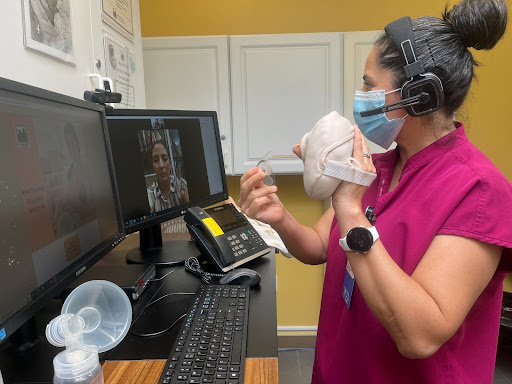
Courtesy of Cecilia Arias, County of San Diego Health & Human Services
Breastfeeding is important for both the mother and the baby. It provides optimal nutrition, boosts the baby’s immune system, reduces the risk of certain diseases, promotes bonding between the mother and the baby, and provides health benefits for the mother postpartum. However, disparities exist among underserved and minority populations.
The American Academy of Pediatrics recommends exclusively breastfeeding for the first six months of life and continue to breastfeed with complementary foods for two years or beyond. However, less than half of infants born in the U.S. are exclusively breastfed through the first three months of life and less than 80% of Latino and Black infants are ever breastfed. In San Diego County, less than seven in 10 African-American parents and less than eight in 10 Hispanic parents report exclusively breastfeeding compared to more than eight out of ten White parents.
Several factors play a role in breastfeeding initiation and duration including education, encouragement, and the availability of medical support in the first week after birth when breastfeeding issues most commonly arise. While hospitals provide some level of breastfeeding education after delivery, many mothers reported that this education was brief and insufficient.
The County of San Diego’s Public Health Services program, Racial and Ethnic Approaches to Community Health (REACH), improved breastfeeding rates among Black and Latino populations in Southeast San Diego and Mid City, through a multi-pronged approach including providing scholarships to increase the availability of Certified Lactation Specialists (CLEs).
REACH has helped to fill the gap in breastfeeding support for new moms by partnering with local Federally Qualified Health Clinics (FQHCs) and home health organizations to enable over 100 community health workers to enroll in the CLE courses at the University of California San Diego extension. In the year 2022, this project increased access and availability to breastfeeding support services as each CLE provided on average 100 consultations per month resulting in a total of 5000 lactation visits among the various clinics. The training has also provided career advancement opportunities for community members. CLEs were able to teach breastfeeding classes, run breastfeeding support groups, and provide general training and one on one counseling on breastfeeding. One trainee wrote, “Thank you for your support for giving me the CLE scholarship, which has allowed me to grow in my career and pursue more dreams. I will be happy to teach and help mothers to have successful breastfeeding and support and increase breastfeeding.”
During and after the COVID-19 pandemic, CLEs increased the breastfeeding appointment rated by 20% after adding the virtual visit option to mothers. Through the increased availability of CLEs, FQHCs were better able to deliver breastfeeding consultations and support to pregnant and postpartum women.
Easy access to breastfeeding support helps new mothers with challenges that arise early in the postpartum period. This increases the likelihood that mothers will continue to breastfeed their babies and improves health outcomes for both. This program enabling real-time virtual breastfeeding support is a best practice that can easily be adopted by other FQHCs.

